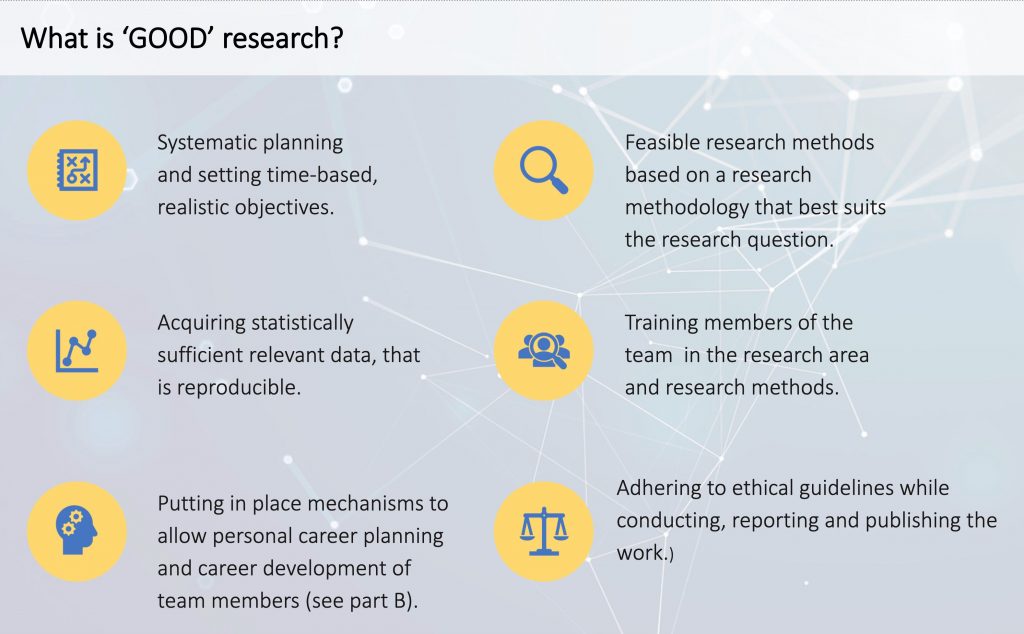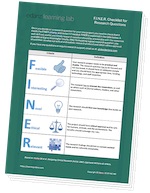Where do good research ideas come from? Researchers around the world see other colleagues publishing high profile papers and they want to do the same. Where are they getting all their great ideas?
Their “secret” is likely some combination of curiosity and clarity. Within these two qualities is all you need, because they encompass your academic/scientific knowledge and an openness to the unexpected.
These qualities will keep you open to the earth-changing ideas and the great little ideas that just…pop up.
Someone, maybe Asimov, maybe Fleming said that “Eureka!” isn’t the most exciting phrase in science. Rather, it’s: ‘hmm… that’s funny.”
In other words, you may not find a question leading to the cure for leukemia, or where antimatter goes, or that lets you identify a comet hurtling toward Earth. But a question leading something else important in your area of expertise may pop up. And you’ll want to research it.
You just need to create the space for that to happen.
In no particular order, we offer these tips on coming up with great research ideas every single day of your research life.
- Create time and space to come up with ideas
- Imitate the success of leaders in your field
- Know your field from every angle
- Look back on your work to see what gets attention
- Make good use of your researcher bubble
- Step outside the researcher bubble
- Apply the F.I.N.E.R. criteria for “good” research
- Know the goals of new research so you can think more clearly
Create time and space to come up with ideas
Busy academics and PhD students often rush from task to task, meeting to meeting. There’s always more to do, and that’s not including your personal life.
Do you stop during the day to just sit and think about your research? Or even, just clear your mind to take some time?
Take a walk, jog, or sprint. Play with the kids. Regrout the bathtub.
These are often the times when the ideas come, when our heads are junk-free. Be ready for those ideas. Have a notepad in your backpack, or whip out your iPhone and take a voice memo.
Taking time to think is one of the best pieces of advice for being a successful (and less stressed) researcher.
Imitate the success of leaders in your field
In your day-to-day research life follow key people in your own field.
Who are the 5 or 10 leaders in your field of research? They might be professors or doctors working in your country, or somewhere far off.
Read their articles (including preprints, letters, and commentaries), look for them in the news, and refer to their work in your own research.
Look at the kinds of questions these experts are working on. Study how their research questions are angled and pitched to journals for publication.
Successful researchers are able to learn from their own mistakes as well as from the success of others. A great research question is one that cuts across more than one field. This gives it the best chance to appeal to more readers, especially if you publish in a higher-impact-factor journal.
Watch how the experts do it. This may be what makes them such stars.
Know your field from every angle
By now, you’re an expert in your specific area. If you’re not, you’re on your way to being one. That’s great, but it’s fleeting and it’s limiting.
How fleeting? That depends on the field. If it’s something dynamic, like vaccines or renewable energy, it’s changing practically daily. So you have to read practically daily.
- Keep up on review papers.
- Follow researchers on ResearchGate and Twitter.
- Use a Google News feed to follow terms and people, or an app like Inoreader or Feedly to follow RSS feeds.
- Follow EurekAlert! and Science Daily for new stories.
- And of course, read good journals, and even low-IF journals.
Let it be known that you know your stuff, on Twitter, LinkedIn, and other online forums. And expose yourself to questions and challenges. Ideas will flourish, guaranteed.
Look back on your work to see what gets attention
Look at the papers you’ve been able to put out so far within your key areas of focus.
Which are performing best? Which are getting…
- the most reads?
- the most downloads?
- the most shares on social media?
- the most citations?
This kind of self-evaluation might give you some ideas about which areas to focus on in the future.
Make good use of your researcher bubble
Ideally, you’re surrounded by curious and smart people like yourself. This includes graduate and undergraduate students. Talk with them. See what’s on their mind. See what their dreams and plans are.
Attend seminars in your department and in other departments. Find what’s both on the minds of those like you and unlike you.
Have regular dialogue with colleagues, whether you have to schedule it or can just pop out for coffee.
And then… go in the completely opposite direction!
Step outside the researcher bubble
Maybe you’re such a diehard academic that your academic and research community is your life. Pull yourself out of it.
New and innovative research solves real-world problems – questions that matter to people outside of our ivory towers.
A key starting point for all research projects should be the question:
How will this work address a question that affects people’s everyday lives?
You need to do research because we’re interested in finding out the answers to questions that matter to us and those around us. You want to satisfy our own interest and curiosity. Yet you want to help. Right?
To do that, you need to get into the real world. Yes, interact extensively with your colleagues and students, but also:
Talk to everyday folks, like your partner’s friends or the person in line behind you at Starbucks.
Engage in activities unrelated to your academic field, such as a freelance writing gig, an activity group in your neighborhood, or online language lessons. These will all get your mind moving in different directions.
You’ll make both personal and mental connections. And ideas will emerge. But do they make good research?
Apply the F.I.N.E.R. criteria for “good” research
Almost all the research we do builds on earlier work. Standing on the shoulders of those who’ve come before us.
Fundamentally, new research should meet the F.I.N.E.R. criteria for designing projects:
- Feasible – Would it be practical and doable?
- Interesting – Would it be interesting to readers, editors, and to the researchers (you)?
- Novel – Would new knowledge be found that builds on past research?
- Ethical – Would it be safe for humans, animals, and the environment?
- Relevant – Would the study address current needs in society?
A research problem you select must be challenging and original, and be potentially achievable by your team.
For more on F.I.N.E.R., we’ve laid it out in an infographic in the Edanz Learning Lab. Create an account to get access (or click up top):
It’s also important to try to select research questions that aren’t simply incremental: a small change or advance on an existing study which leads to no lasting scientific insight.
Incremental research will lead to you and your group gaining a “mediocre” reputation and will therefore affect your ability to win research grants and get your work published in leading journals in the figure.

Know the goals of new research so you can think more clearly
New research seeks to confirm work done before, either by doing the same thing in a slightly different way (e.g., on a different population or species) or using a new or modified method.
We’re aiming to solve problems still in search of answers. Either ones that are issues in our fields or ones that haven’t been addressed in earlier work, or have since been disproved.
Learn more about the goals of new research in a handy infographic in the Edanz Learning Lab. Just create an account to get access (you can also click up top).
Research that solves a completely new problem is the ultimate goal. It makes a major step forward to the literature in your field. But it needn’t be the only goal, and that incredibly high standard may be blinding you from other avenues and ideas.
Get expert assistance with research ideas
Are you having trouble finding research ideas? Need help analyzing gaps in the literature? Want to generate ideas and/or evidence? We offer services to help you with all these steps in the research cycle.
Our Edanz experts can help you. Ask us anything.





